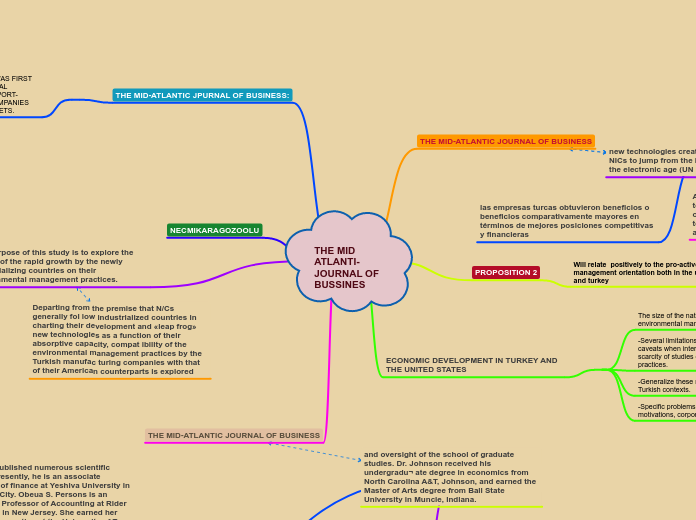THE MID ATLANTI-JOURNAL OF BUSSINES
THE MID-ATLANTIC JOURNAL OF BUSINESS
PROPOSITION 2
Will relate positively to the pro-activenes of management orientation both in the united states and turkey
environmental innovativeness refers to the extent to which a company invests in new environmental technologies and engages in new envioromental programs and projects.
ECONOMIC DEVELOPMENT IN TURKEY AND THE UNITED STATES
The size of the nation allowed for proactive environmental management in the United States.
-Several limitations associated with this study require caveats when interpreting the results. -The relative scarcity of studies on environmental management practices.
-Generalize these results beyond the American and Turkish contexts.
Conclution
-Specific problems, managerial responsibilities and motivations, corporate strategies and cultures differ.
THE MID-ATLANTIC JPURNAL OF BUSINESS:
RESULTS AND DISCUSSION THE DATA WAS FIRST TESTED TO EXPLORE IF ENVIRONMENTAL MANAGEMENT PRAC-TICES OF THE EXPORT-ORIENTED COMPANIES AND THOSE COMPANIES WITH FOREIGN PARTNESHIP ENGAGEMETS.
NECMIKARAGOZOOLU
The purpose of this study is to explore the impact of the rapid growth by the newly industrializing countries on their environmental management practices.
THE MID-ATLANTIC JOURNAL OF BUSINESS
companies with proactive environmental orientation toward more proactive environmental orientations in the WORLD BANK 1997 companies global integration through global trade liberalization.
new technologies create opportunities for NICs to jump from the industrial revolution to the electronic age (UN Chronicle, 1985).
las empresas turcas obtuvieron beneficios o beneficios comparativamente mayores en términos de mejores posiciones competitivas y financieras
Advances in information and communication technologies, in particular, enable NICs to overcome development hurdles if these technologies are successfully adapted and applied
Departing from the premise that N/Cs generally fol low industrialized countries in charting their development and «leap frog» new technologies as a function of their absorptive capacity, compat ibility of the environmental management practices by the Turkish manufac turing companies with that of their American counterparts is explored
and oversight of the school of graduate studies. Dr. Johnson received his undergradu¬ ate degree in economics from North Carolina A&T, Johnson, and earned the Master of Arts degree from Ball State University in Muncie, Indiana.
. He has published numerous scientific papers. Presently, he is an associate professor of finance at Yeshiva University in New York City. Obeua S. Persons is an Associate Professor of Accounting at Rider University in New Jersey. She earned her Ph.D. in accounting at the University of Texas at Austin. Her research interests include corporate governance, executive compensation, regulatory im¬ pact on financial reporting and firms' valuation, predictive value of financial statements, international accounting and accounting education. Her publications have appeared in
Dr. Johnson is currently the chair of the Board of Directors ofUNC Teaching and Leaming with Technol¬ ogy Collaborative. He also serves as a member of the North Carolina Banking Commission and the following boards: Harvard Institute for Higher Education, MLE, Leading Transfor¬ mation and Change; Winston-Salem Downtown Development Corporation; WINSTONNET and the Simon Green Atkins Community Development Corporation.
The general compatibility of the environmental management practices of Turkish companies with their American counterparts.
-The pressure exerted by the scientific community, the government.
-Product stewardship and environmental sustainability
-The most advanced environmental management applications require an increase in green consumerism.
- As pollution prevention moves towards the "zero emissions" standard in the production system, further improvements require changes in product design and entirely new technologies.
ATLANTIC JOURNAL OF BUSINESS
- per capita production decreases with population growth.
- the least countries face the so-called challenge of the demographic boost.
- An equally important challenge for the NICS, in relation to their pursuit of higher levels of economic development
- Thus ensuring successful integration with the relentless global eco-based systems.
